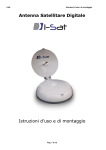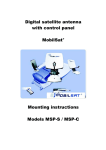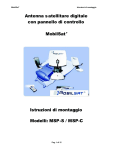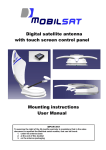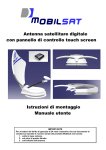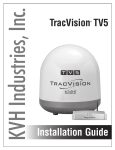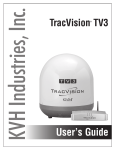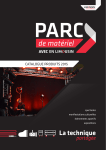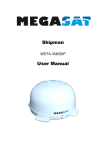Download Digital Satellite Antenna Mounting and usage instructions
Transcript
i-Sat Mounting and usage instructions Digital Satellite Antenna Mounting and usage instructions Page 1 of 12 i-Sat Mounting and usage instructions Summary 1. 2. Introduction .......................................................................................................................................... 3 Safety instructions................................................................................................................................ 3 2.1. Proper use (for the intended purpose) ............................................................................................ 3 2.2. Safety during installation work ...................................................................................................... 3 2.3. Proper installation and safety ......................................................................................................... 4 2.4. Adhesive sealant ............................................................................................................................ 4 2.5. Road Traffic Licensing Regulations .............................................................................................. 4 3. Certifications ........................................................................................................................................ 4 4. Package contents .................................................................................................................................. 5 5. Unpacking and preparation ................................................................................................................ 5 6. Mounting............................................................................................................................................... 5 6.1. Mounting in a fixed position .......................................................................................................... 5 6.1.1. Selection of the mounting position ........................................................................................ 5 6.1.2. External unit space requirements ........................................................................................... 6 6.1.3. Fixing plate mounting ............................................................................................................ 6 6.1.4. Passing the cables through the roof ....................................................................................... 7 6.1.5. Cable installation ................................................................................................................... 7 6.1.6. Power supply.......................................................................................................................... 7 6.1.7. Protection circuit .................................................................................................................... 8 6.1.8. Connection to the satellite receiver ........................................................................................ 8 6.1.9. Dismounting of the antenna ................................................................................................... 8 6.2. Mounting on a mobile position ...................................................................................................... 9 7. Usage instructions ................................................................................................................................ 9 7.1. General notes ................................................................................................................................. 9 7.2. Power on ........................................................................................................................................ 9 7.3. Satellite selection and search ......................................................................................................... 9 7.4. Skew or cross-polarization tuning ............................................................................................... 10 7.5. Manual positioning ...................................................................................................................... 10 7.6. Power off ...................................................................................................................................... 11 7.7. Failures or errors .......................................................................................................................... 11 7.7.1. Generic errors....................................................................................................................... 11 7.7.2. Reported errors..................................................................................................................... 11 7.7.3. Reset alarm condition .......................................................................................................... 12 7.8. System Reset ................................................................................................................................ 12 8. References ........................................................................................................................................... 12 Page 2 of 12 i-Sat Mounting and usage instructions 1. Introduction Read carefully and completely this manual before starting with mounting operations. ATTENTION The antenna and the remote control must be mounted only by qualified personnel In order to prevent danger during mounting operations, during normal operation and during vehicle moving, please observe carefully the information provided in this manual. The correct execution of the mounting operations and a correct cabling of the system are fundamental prerequisites to guarantee conformity with related regulations. The system is covered by CE brand and by a conformity declaration, as reported in Chapter 3. 2. Safety instructions 2.1. Proper use (for the intended purpose) The i-Sat is designed to receive digital TV and radio programs via satellite. The turntable can be used to receive digital TV and radio signals in the frequency range from 10.70 to 12.75GHz. Any use other than that specified above will void the warranty or guarantee. The following circumstances result in the loss of all warranty and liability claims towards the manufacturer: • Improper installation • Use of non-specified mounting materials, which cannot guarantee the mechanical reliability of the antenna system • Non-permissible use, e.g. use of the planar antenna for storage • Structural changes or interference with the components and mounting accessories in the set, which could endanger both the mechanical and functional reliability • Improper or forcible opening of the components • Use of cleaners containing solvents, such as acetone, nitro-cellulose combination thinners, degreasers, petrol, etc. • Failure to observe installation and safety instructions in this manual • Breaking of warranty seals The turntable may be operated in an ambient temperature range of -10 °C to +40 °C. Operating the system outside this range may result in malfunctions or damage to the system. 2.2. Safety during installation work When carrying out installation work in locations where there is a risk of falling, take appropriate safety precautions, e.g. use of a working platform. Make sure that the vehicle roof is sufficiently strong and stable to carry out the installation work (risk of damage or collapsing of roof). Page 3 of 12 i-Sat Mounting and usage instructions Make sure that: • The turntable and connected units are disconnected from the power supply • The person carrying out the installation or repair does not suffer from vertigo and can move around safely on the roof of the caravan or motor home • The person carrying out the repairs is wearing sturdy and non-slip shoes • The person carrying out the installation or repair has a secure position to stand and hold on while working • The roof and the climbing equipment used (e.g. ladder) are dry, clean and non-slip • The roof can withstand the weight of the person carrying out the repairs • Nobody should be inside the caravan/motor home underneath the antenna during dismantling/installation 2.3. Proper installation and safety A crucial safety factor is proper performance of installation and electrical connection work, and the specified alignment of the turntable in the direction of travel (park position), see also installation and connection. Follow as precisely as possible the installation conditions and steps described. Modifications to the electrical installations in the vehicle should only be carried out by a specialist in vehicle electrics. Do not make any unauthorized changes to the turntable. 2.4. Adhesive sealant The turntable is attached to the roof of the vehicle by adhesive and is secured by additional fixing screws. Note that the curing of the adhesive sealant is temperature-dependent. It reaches its full strength only after approximately 48 hours. 2.5. Road Traffic Licensing Regulations The applicable regulations must be observed in respect of fixed installation of the turntable on a vehicle which is driven on public highways. In particular, §§ 19/2; 30 C; 32 (2) and the EC directive 74/483 EEC are applicable. Briefly, they state that no endorsement of the vehicle documentation is required unless the antenna unit causes the height of the laden vehicle to exceed 2mt, or the antenna unit projects beyond the outer lateral outline of the vehicle. The maximum eligible height of 4mt (vehicle and antenna unit) must not be exceeded. 3. Certifications i-Sat complies with the following regulations: Electromagnetic compatibility: Safety: IP graduation: Vibrations: EN55022, EN55024 EN12100-1, EN12100-2, EN294, EN349 EN60529 95/56/CEE Page 4 of 12 i-Sat Mounting and usage instructions 4. Package contents The received package contains the following items: - External unit with antenna - Remote control - Fixing plate - Power supply cable - Cable (4mt) for the connection with external unit - Mounting and usage instructions - 11mm wrench for F connectors - Wrench for security screw 5. Unpacking and preparation Please keep original packaging material because it will be needed in case of system return for repair or maintenance actions. In other cases the supplier will not be responsible for damages occurred during transport. Please keep packaging materials out of reach of children. 6. Mounting 6.1. Mounting in a fixed position 6.1.1. Selection of the mounting position After all doubts concerning roof stability have been eliminated and after all necessary measures have been taken on order to assure a proper and safe assembly, position the antenna in the planned mounting position. Position the fixing plate, taking care that the arrow on the plate is oriented towards the front of the caravan. Once positioned, the antenna must be oriented towards the rear of the caravan, opposite to driving direction (see figure). All other positions will be considered as not correct. For the final choice of the mounting position, be absolutely sure of antenna space requirements during normal operations. Front Rear Page 5 of 12 i-Sat Mounting and usage instructions 6.1.2. External unit space requirements Be sure that there is enough space for the folded up system and for the complete rotation of the antenna. For a complete rotation of the antenna during the normal operation the roof of the vehicle must be free of obstacles. The space requirements for a correct mounting of the external unit are displayed in the following figures: 6.1.3. Fixing plate mounting Remove the system from the fixing plate unscrewing the safety screw, rotating the antenna about 10 degrees clockwise and raising the upper part. ATTENTION Position the satellite cable on the caravan roof BEFORE pasting the plate. When pasting the cable must be positioned in order to fill one of the four holes in the lower part of the plate Page 6 of 12 i-Sat Mounting and usage instructions The assembly plate must be glued to the roof using a commercially available sealing compound. For the cleaning of the roof and the assembly plate use a special cleaning agent recommended by the manufacturer of the sealing compound (e.g. SikaFlex 252, Teroson 1K-Pur). After the sealing compound has been dried, apply the sealing compound to the bottom of the plate and strongly apply the plate to the roof of the vehicle. If the roof of the caravan does not have the needed consistency, fix the plate with the tapping screws, in order to obtain a stable and safe assembly. When finished, block the antenna using the security screw. The manufacturer can not be indicated as responsible for damages caused by an incorrect mounting. ATTENTION Do not close the 4 holes in the fixing plate; they allow the passing of the cable and assure rain outflow. 6.1.4. Passing the cables through the roof To pass the cables through the roof use, if available, the system adopted by the manufacturer of the caravan. If no default manufacturers’ system is available, install an appropriate cable through. Block the cable between the external unit and the cable through, in order to avoid movements that can cause cable wear or break. Protect the cable from external weather conditions using appropriate electrical conduits. Check carefully the point where cable pass through the roof and the strength of the blocking screws, if used. a) b) c) d) 6.1.5. Cable installation Lead the cables coming from the external unit toward the remote control Take care to cable fixing, in order to avoid oscillations - when the caravan is in motion. Such oscillations could damage or broke internal wires; along the route to the control unit fix the cable to the caravan walls using a commercially available cable fixing system. If the cable is too long, coil it up near the remote control, fixing it in an appropriate way. For installations with a cable length greater than 4mt, use high quality cables with crimped Fconnectors. The maximum allowed cable length is 10 mt 6.1.6. Power supply Provide a sufficient power to the system. The system can be powered by a 12V or a 24V power supply Notes for power supply on trailers Often trailers don’t have a stable power supply, or they don’t have a battery at all. In these cases it’s necessary to power the system using a 220V/12V 2A voltage transformer, connected directly to the main line. Do not use in any circumstance battery chargers, economic transformers or non-stabilized power packs. Once the system is powered it will perform automatically an internal auto-test. If the Led under the ON/OFF key flashes with a red light, see the reported errors table at page 11. Page 7 of 12 i-Sat Mounting and usage instructions In the following picture is displayed the electric diagram: 6.1.7. Protection circuit IMPORTANT In order to avoid damages by inadvertently driving with the external unit folded-up, connect the yellow cable to the +15 vehicle line or the D+ line that carries voltage when the engine is on and no-voltage when the engine is switched off. In this way the external unit will be automatically retracted when the caravan engine will be switched on. 6.1.8. Connection to the satellite receiver connect the antenna system to the satellite receiver, using the male F-connector cable coming from the remote control. Now the system can be considered as completely mounted 6.1.9. Dismounting of the antenna When needed (e.g. caravan parked under the trees or an obstacle present in the satellite direction) it is possible to quickly dismount the antenna from the fixing plate, and to position it in a point where the satellite signal can be received better. Execute the following steps: - Unscrew the screw that blocks the antenna to the fixing plate - Turn the antenna 10 degrees clockwise - Raise it taking care of do not exceed in the movement, to avoid to rip the connection cable - Unscrew the F connector, using the 11mm key supplied with the system Now the antenna can be positioned where desired, taking care of placing it horizontally and to connect it to the remote control using a good quality 75Ohm satellite cable equipped with a F connector. In these cases the antenna can be mounted on a tripod, available as option, equipped with a fixing plate identical to the one mounted on the roof of the caravan. Page 8 of 12 i-Sat Mounting and usage instructions 6.2. Mounting on a mobile position Execute the following steps: - Position the antenna and the fixing plate on a plain surface, free of obstacles in the satellite direction. For an outdoor usage is available a specific optional tripod. - Connect the 4mt 75Ohm satellite cable, supplied with the system, using the 11mm key. - Connect the output of the remote control to the satellite receiver. - Connect the power supply cable (12V or 24V) to the remote control. Now the system is ready to be used. 7. Usage instructions 7.1. General notes When the system is powered the antenna, if opened, will be closed automatically. When the system is powered the led under the ON/OFF key will flash green every 4 seconds. This means that the system is ready to be used. In the figure is displayed the system remote control. 7.2. Power on To switch on the system press the ON/OFF key. The led under the key and the one related to the last selected satellite will become steady green. In case the led under the ON/OFF key will become red, see the reported errors table at page 11 and execute the related instructions. 7.3. Satellite selection and search To select another satellite press quickly the SAT key. The selected satellite is displayed by the related green LED. To activate the Satellite search press the SAT key for 3 seconds. During the search phase the related satellite led flashes red; if the satellite is found the led becomes steady green. If the system is not able to found the satellite signal the satellite led will become steady red. To stop the search function at any time press the SAT key. Page 9 of 12 i-Sat Mounting and usage instructions 7.4. Skew or cross-polarization tuning Thanks to the new advanced technologies, the area where it’s possible to receive correctly a satellite signal is increasing more and more. All Europe dedicated TV satellites obviously point their signals over Central Europe. When the receiver – your caravan – is outside this area, the antenna looks at the satellite by side, from a certain “angle”. This effect is called “skew” or "polarization” and affects the receivers located in several countries: Portugal, South Spain, Morocco, Greece and Western Russia . Normally the satellite system is able to compensate this effect without problems, but in some cases a manual LNB re-positioning is needed; in practical terms, the LNB must be rotated by some degrees. In the following table are displayed the necessary corrections of the SKEW effect, for some European countries (approximated values) Zone South Spain Portugal Greece West Russia Other countries Astra I +15° +15° -12° -15° 0° Hotbird +10° +15° -15° -15° 0° For positive values it is necessary to rotate the LNB CLOCKWISE, using as zero reference the central position. For negative values the arm must be rotated COUNTERCLOCKWISE. Execute the following steps: - Slightly unscrew the 4 allen keys that block the waveguide - Turn the waveguide clockwise or counter-clockwise. The maximum allowed angle is 15° - Block again the previously unscrewed screws For manual antenna positioning it is necessary that satellite receiver and TV set are switched on, in order to evaluate correctly the signal strength and quality. . 7.5. Manual positioning When the antenna is not moving, pressing simultaneously ON/OFF and SAT keys for more than 2 seconds switches to manual positioning mode. See the following table. 1 2 3 4 5 6 ON/OFF and SAT pressed >2 sec Operation ON/OFF and SAT pressed >2 sec Operation ON/OFF and SAT pressed >2 sec Operation Automatic mode manual mode Manual positioning of elevation motor Change motor Manual positioning of rotation motor Manual mode automatic mode Automatic mode Page 10 of 12 i-Sat Mounting and usage instructions . Every time there’s a mode/controlled motor switch, the red and green leds are switched on. Release the buttons as soon as the mode/motor is changed, to avoid system reset 7.6. Power off To close the antenna and switch off the system press the ON/OFF key for 3 seconds. For a better safety the system will automatically switch to stand-by status, closing the antenna dish, when the vehicle engine is started. 7.7. Failures or errors 7.7.1. Generic errors In the following table are displayed the most common failures/errors and the related solutions, if applicable. Failure The system does not power up The antenna performs the automatic satellite search but the TV does not display any signal Possible solution Check the fuse on the power line. Check that all cables are correctly plugged in Check that the direction toward South is free from obstacles (building, mountains, trees, …) Check that in your location it is not necessary to compensate the skew angle Check if you are in the area covered by the selected satellite Check that all cables are correctly plugged 7.7.2. Reported errors When iSat antenna is in pre-alarm state the ON/OFF led blinks red. The pre-alarm condition is activated when the system detects an error that needs a slow protection. When iSat antenna is in alarm state the ON/OFF led is steady red, and the satellite leds show the type of error detected. Alarm Led 1 Hotbird led red 2 Astra1 led red 3 4 5 6 7 Astra2 led red Astra3 led red Astra4 led red Atlantic Bird3 led red All leds red Cause Low battery (< 10V) or overload due to a excessive antenna absorption No communication between antenna and remote control. Cable broken or not connected Dish closing error LNB broken or not powered Elevation mechanical failure Rotation mechanical failure Dish closing error when engine key inserted Notes: In case of low battery, the error condition must be verified for at least 10 consecutive seconds, in order to avoid false alarms due to short low voltage transitions; during these 10 seconds (pre-alarm) the ON/OFF and Hotbird led will blink red. In the first three cases, the remote control will switch-off the antenna. Page 11 of 12 i-Sat Mounting and usage instructions 7.7.3. Clear alarm condition When an alarm is detected, it’s possible to clear the alarm condition pressing the ON/OFF key for more than 3 seconds but less than 6 seconds. ATTENTION If the ON/OFF key is pressed for more than 6 seconds the whole system will be reset The functions activated by the clear alarm procedure are: Alarm Action performed 1, 2, 3 The electronics will be reset and the antenna will act as the first power on; the first operation will be dish closing. If the error is detected again, the alarm condition will be activated again 4, 5, 6 The system passes in “Satellite selection” state 7 Dish closing continues 7.8. System Reset Except of standby state, in all the remaining states it is possible to reset the whole system pressing the ON/OFF key form more than 6 seconds. In this case the antenna is reset as the first power on and the first operation will be the dish closing. In the following table are described the reset operations. ON/OFF key pressed 1…3Sec 3…6 Sec > 6 Sec. LED ON/OFF State Red led blinking every 0,25 sec. Green led maintains its state Red led blinking every 0,1 S sec. Green led switched off Red led steady on Reset activation time is > 3 Sec. ON/OFF key release reset only the alarm condition. Reset activation time is < 3 Sec. ON/OFF key release reset only the alarm condition. Whole system reset 8. References Mobiltech s.a.s. Via Brughetti, 9/E 20030 Bovisio Masciago (MI) Tel: (+39) 0362 – 544.928 Fax: (+39) 0362 – 576.478 Internet: www.mobiltech.it Mailto: [email protected] Page 12 of 12












